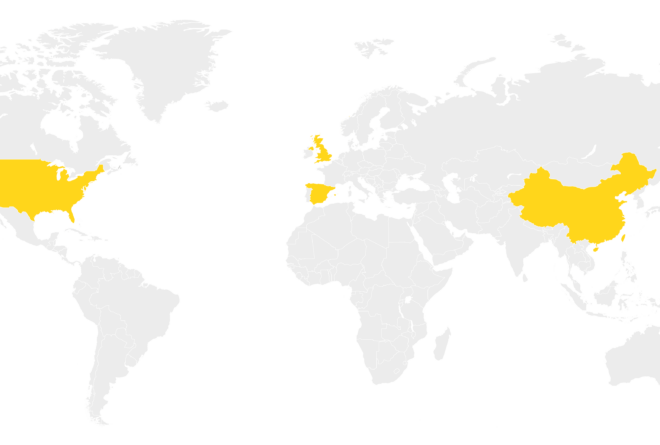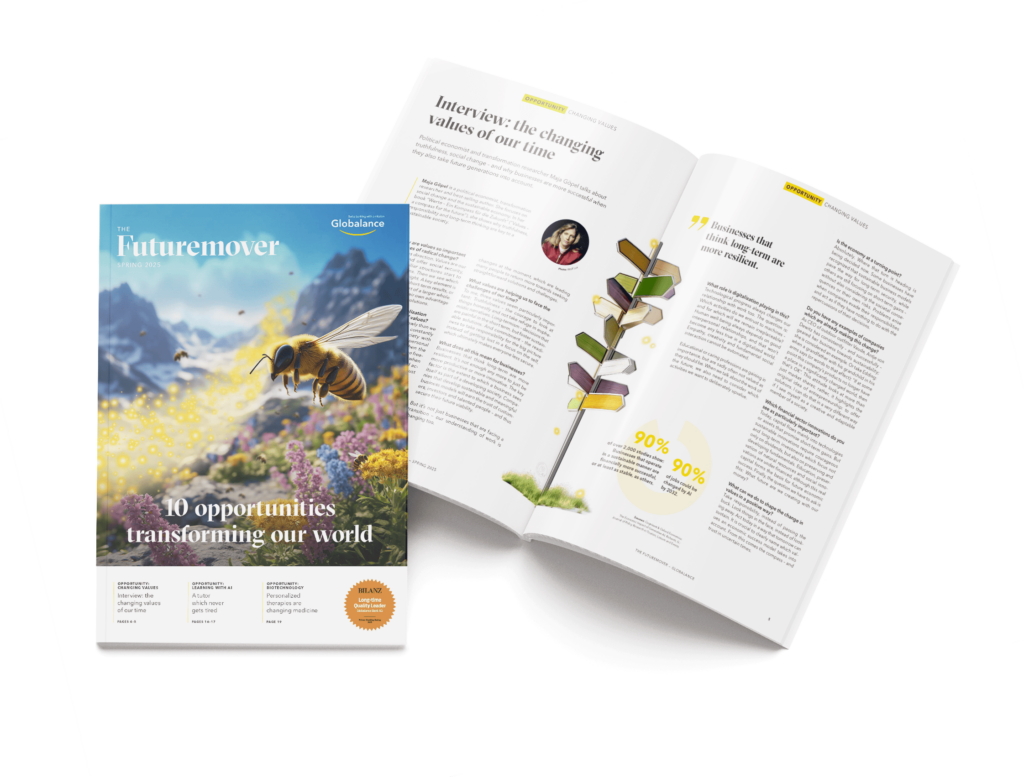News & Trends
Technologies that change our world

They’ve always existed: innovations that have the potential to fundamentally change our lives. Thanks to the latest megatrends, technological progress is developing at an ever faster rate. What does this mean for our economies? And for investors?
For centuries, education was reserved for monks and nuns — along with a few noblemen: through years of painstaking work in the monasteries of Europe, they drew ornate letters, words and sentences on parchment, binding together the precious pages with the copied texts to produce magnificent books. In 1,440, Gutenberg revolutionized access to the most valuable of all items — the book — through letterpress printing. Reading and learning now became affordable for larger sections of the population.
Education underwent a similar, radical change with the invention of the internet: knowledge became a mass-market product that was available to nearly all and nearly everywhere. The internet changed the way we work as well as the way our economic systems operate.
AI handles complex tasks
Today — only a few decades later — we are already on the verge of another education-transforming breakthrough: Artificial intelligence (AI) is in the process of shaking up the workplace at lightning speed. It is redefining work and — once again — access to education. Fact is, not only does AI democratize knowledge — it also enables access to complex skillsets: It takes care of reading, analysis and content-writing for us. The computer recognizes con[1]texts and makes forecasts on our behalf. The quantum computing megatrend will also bring currently unimaginable innovations and separate our lives into “before” and “after” periods.
Innovation-friendly structures needed
Visions alter our everyday lives — regardless of how innocuous or revolutionary the changes are. However, good ideas are not sufficient for achieving progress. That takes courageous, creative entrepreneurs — ambitious people who believe in an idea, even if it seems impossible. It requires start-ups that will develop an idea into a product, solution or service that benefits our society and our economy — be that in relation to consumption, work, medicine, government, science or the social fabric. Innovative firms in turn depend on innovation-friendly structures as well as on far-sighted investors who are willing to invest in their projects. Were it not for these four factors — vision, entrepreneurship, innovation and investment — our society would come to a standstill.
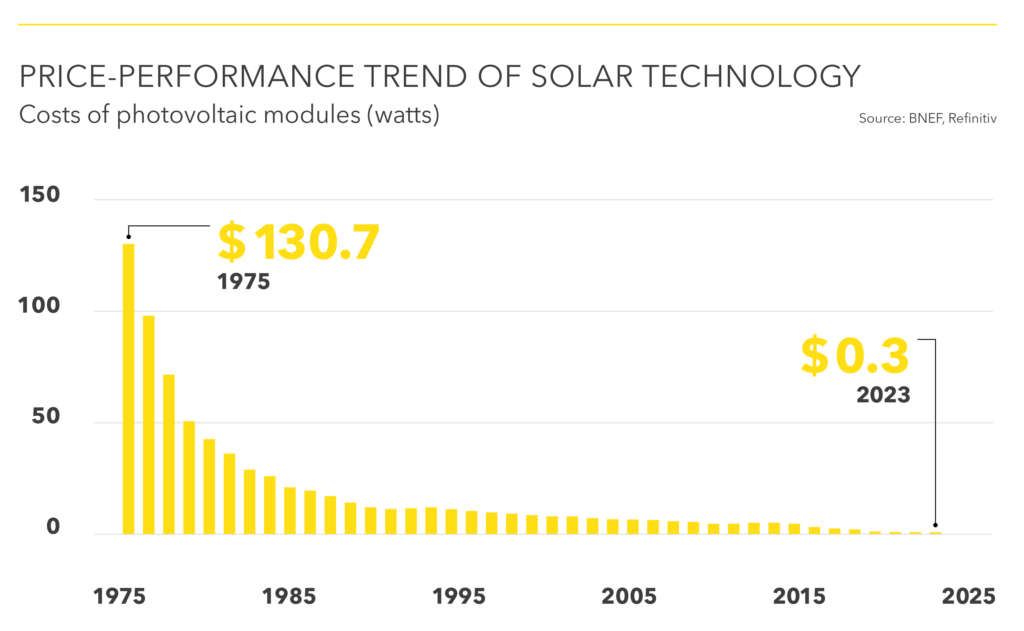
Addressing global challenges
The global megatrends illustrate the extent to which innovations will change the world. That makes it all the more important for us to be guided not just by economic objectives but also by forward-looking visions: We need to address environmental and social challenges through new technologies. Fact is, the innovations of previous centuries have left their mark and resulted in massive social and environmental imbalances.
Today, start-ups show us how we can tackle global challenges such as poverty, environmental issues and social injustice through innovative entrepreneurship. The Global Innovation Index 2024 (GII) shows the huge potential for social innovation. Investment in courageous start-ups brings rewards not just in the form of new business areas and returns but simultaneously also in the form of positive change to social and environmental structures. As the GII highlights, however, this progress is dependent on social/innovation-friendly structures.

Making room for innovation
Swiss companies are equally dependent on an innovation-friendly setting. Indeed, Switzerland remains the world leader for innovation. We lead the global ranking list of the GII for the 14th time in succession. Switzerland is an innovation leader, ahead of Sweden and the US. However, the report also shows that emerging-market countries like China, Turkey and India are rapidly catching up, despite their economic disadvantages.
The world’s largest science and technology clusters are also sited in Asia, the biggest being in Japan. Europe is a leader thanks to Paris (12th position), London (21st) and Munich (22nd), while Switzerland has two innovation clusters in the top 100 with Zurich (50th) and Basel (96th). As the index shows, however, we cannot rest on our laurels; rather, we need to continue investing in our innovative capacity. Politicians and business now need to work together to make room for innovative individuals.
Fact is, our world is dependent on innovations. We rely on new technologies such as renewable energy, e-mobility, innovative materials and AI applications because, as well as providing economic growth, they also address global challenges such as the climate crisis, social injustice and the exploitation of renewable resources.
Rapid growth in start-ups
Young entrepreneurs play a crucial role here. Up until only a few years ago, Switzerland’s innovative strengths were concentrated on giants such as Novartis, Nestlé and Swatch — as well as niche firms like Stadler Rail. The picture has changed since 2019, with promising technology start-ups springing up — particularly in Zurich, Valais and Geneva. A very high proportion of them pursue sustainable objectives. According to the Swiss Venture Capital Report, around 300 start-ups are currently being set up every year. In total, nearly CHF 4 billion has been invested in Swiss start-ups since 2022. This compares with a figure of only CHF 300 million ten years ago. Start-ups have also created an above-average proportion of jobs in recent years and are now considered the engine of Swiss innovation.
According to Swiss Startup Radar, Swiss start-ups are ahead in terms of sustainable innovation: on a per-head basis, no other country has more tech start-ups contributing to sustainability through their products or services. Their primary focus is on new technologies such as AI, and they play a key role in its development: Through the use of self-learning algorithms, they make processes more efficient. They use AI applications to predict events more accurately. Or they develop products that — thanks to AI — preserve resources or are actually beneficial to the environment: drugs for previously untreatable diseases, circular substances and climate-positive materials. This applies in the field of biotech start-ups in particular, but also in companies in the energy and cleantech, medtech and ICT sectors.
Swiss start-ups were early in recognizing that AI is poised to transform the economy as a whole. According to Swiss Startup Radar, however, Switzerland is not yet able to translate this “unique potential into growth”. In no other country is there such a big discrepancy between the number of AI firms and the financing available to them. By way of comparison: ten times more money was invested in Israeli start-ups than in their Swiss peers in 2024. If this is to change, the entire ecosystem surrounding start-ups needs to be improved.
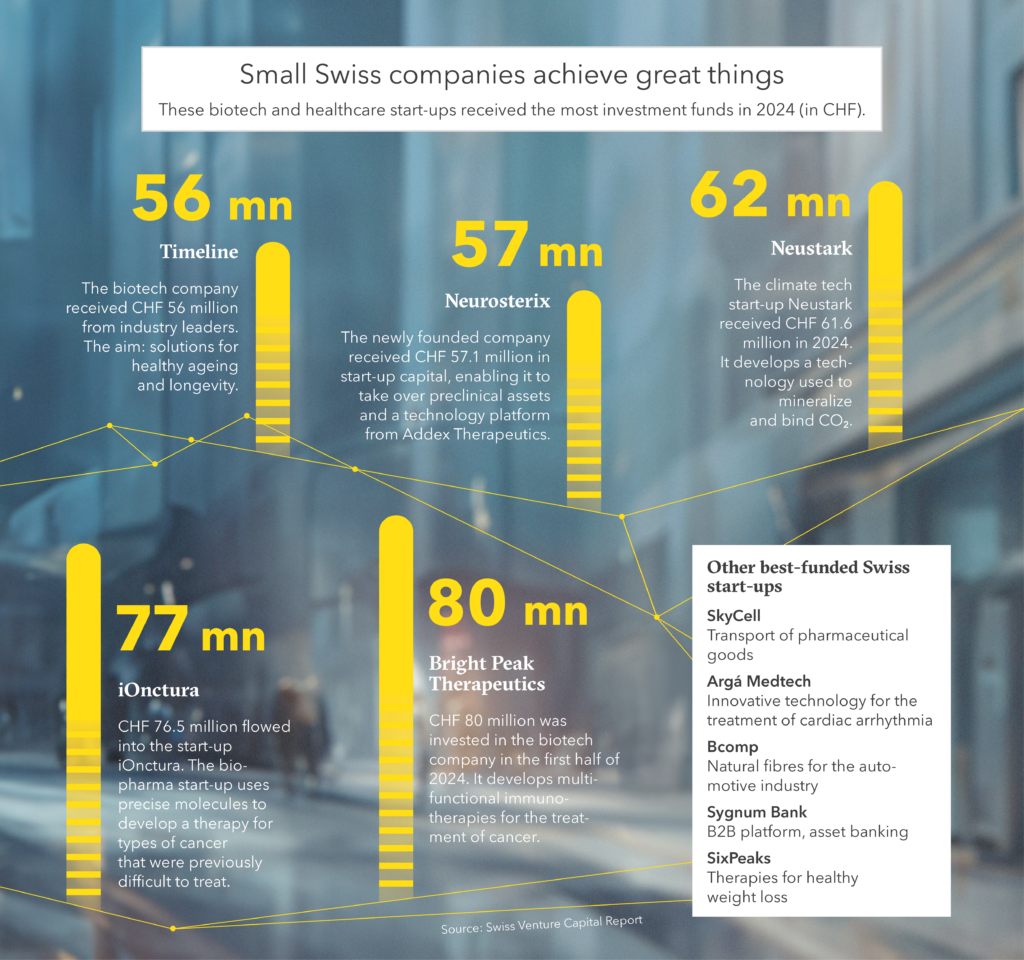
Investing for the future
As an investor, you are one of the key factors in successful innovation — and therefore in our economic, environmental and social development. For Globalance, investing in companies that are innovative and promote a positive footprint means investing with the aim of generating returns and simultaneously taking responsibility. We invest in forward-looking solutions and innovative companies. As well as enabling us to achieve a financial gain, it also means we can address the preservation of our vital natural resources.
Why not invest in companies that contribute to environmental equilibrium? Globalance will support you. By investing in the future, you can:
- capture new business opportunities and generate financial returns
- improve your competitiveness
- always be certain of what impact your assets are having on climate and footprint
- help put the world on a sustainable footing
We identify forward-moving companies by using a specially designed matrix that measures innovative capacity and the positive footprint on an equal basis.
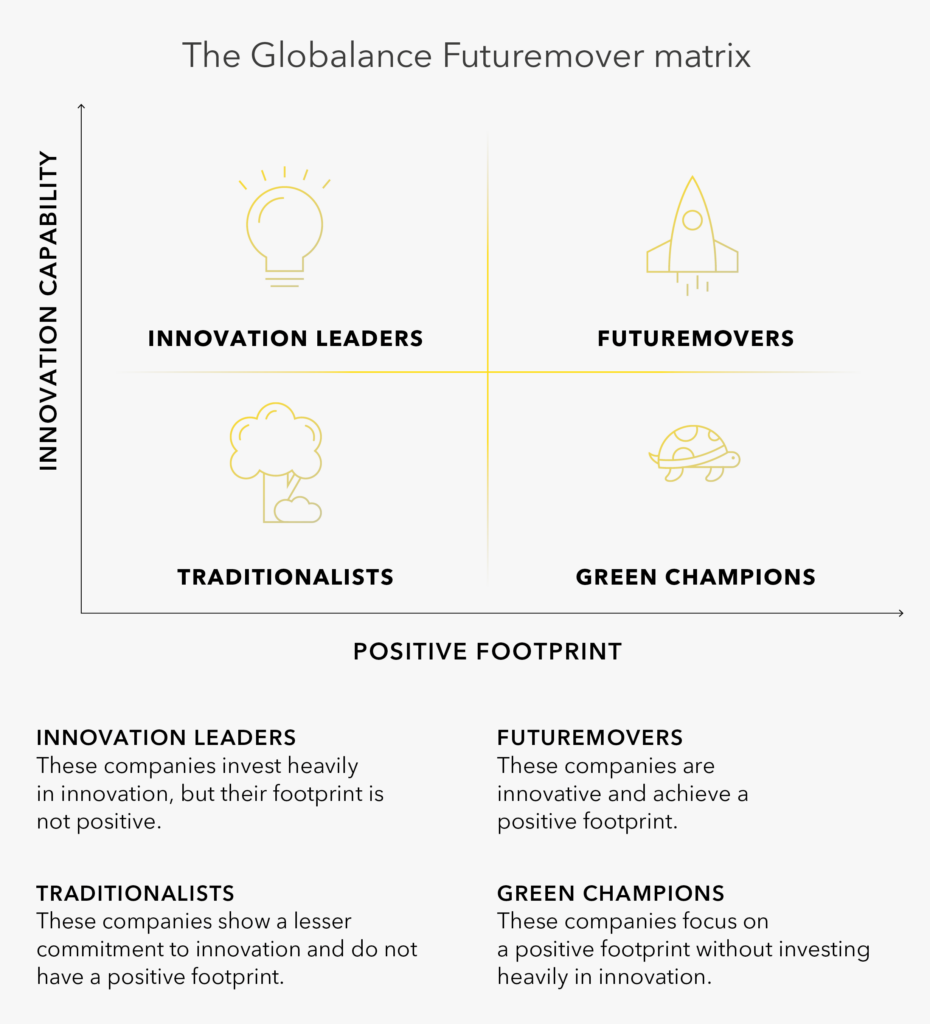
Be part of the solution and stay informed with the Futuremover.
Subscribe now and shape the future!
Magazin abonnieren EN
"*" indicates required fields
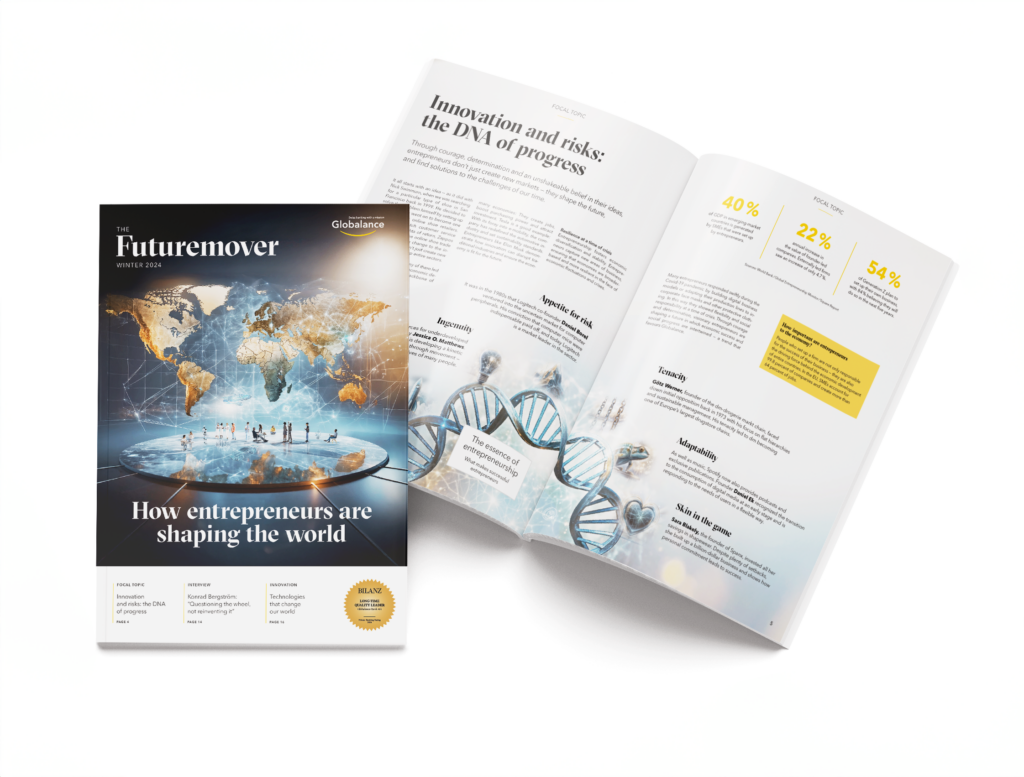
Discover the entire issue
Read more articles from our current issue: ‘How entrepreneurs are shaping the world?’.









